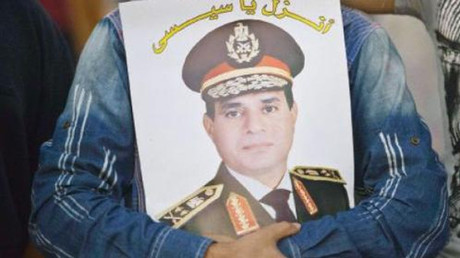Gulf Regimes Aid Egypt's Sisi to Ensure Own Security
إقرأ هذا الخبر بالعربية
Leading Gulf monarchies are staunchly backing Abdel Fatah al-Sisi, Egypt's presidential frontrunner, in the hope that their generous financial help will bolster his campaign to crush the Muslim Brotherhood and indirectly secure their own regimes.
"An absence of stability in Egypt means instability in the Gulf," says Emirati political science professor Abdulkhaleq Abdulla.
Sisi "represents Egypt's only national institution that is capable of restoring stability" in his country, situated across the Red Sea from Saudi Arabia, he explains.
Since the Sisi-led military ousted elected Islamist president Mohamed Morsi last July, the new authorities banned his Muslim Brotherhood, arrested its leaders and cracked down on its followers in a campaign that has killed more than 1,400 people.
On May 5, Sisi said the Brotherhood, also banned in many Gulf countries and designated as a "terrorist organisation" by Saudi Arabia, was "finished" in Egypt and would not return if he is elected.
Those were encouraging words for the absolute monarchs in the Gulf, who relations with Egypt deteriorated dramatically during the rule of Morsi, elected following an Arab Spring-inspired uprising that long-time Saudi ally Hosni Mubarak.
As the Brotherhood gained prominence in several Arab Spring countries, Saudi Arabia watched cautiously, while the UAE launched an unprecedented crackdown down on Islamist activists on its soil.
In January, it jailed a group of 30 Emiratis and Egyptians for terms of three months to five years for forming a Muslim Brotherhood cell.
At the same time, disagreement over the Brotherhood has soured relations with fellow Gulf Cooperation Council member Qatar, the only Gulf country to back Morsi.
Saudi Arabia, the UAE and Bahrain all withdrew their ambassadors from Doha in March. Saudi Arabia and the UAE accused gas-rich Qatar of offering refuge to Muslim Brotherhood figures, among them dissidents from their countries.
- Brotherhood a Gulf 'nightmare' -
The Gulf's monarchies share concerns about the Brotherhood's brand of grass-roots activism and political Islam, which could spread across the region and undermine their authority if the group were ever to rule the Arab world's most populous country for any length of time.
London-based analyst Abdelwahab Badrkhan said an Islamist regime in Egypt "could have used religion to spread influence across the Arab region restoring Egypt's leadership role with an Islamist shade."
For many Gulf monarchies, the thought of "this was a nightmare`," he said.
Moreover, the possibility of an Islamist-ruled Egypt warming to Saudi regional rival Iran or allying itself with Turkey's ruling Islamist-rooted Justice and Development Party fuelled fears of a shift of power in the Middle East.
"When a chance of Egyptians rejecting the Muslim Brotherhood surfaced, Gulf regimes moved in to back the military, which was the only force that could ensure the ouster of the Brotherhood without causing a disaster such as civil war," said Badrkhan.
Immediately after Morsi's ouster, the UAE, Saudi Arabia and Kuwait pledged a combined $12 billion in aid to Egypt's faltering economy.
The UAE later pledged a further $3.9 billion and its Arabtec construction company signed a memorandum of understanding to develop a $40 billion project for one million housing units in the North African country.
In an interview broadcast earlier this month, Sisi said aid from the Gulf has amounted to $20 billion.
Speaking at a forum in Dubai on Tuesday, Egypt's interim prime minister Ibrahim Mahlab said "we will not forget the friendly hands that have extended in support for us."
This support, which is mainly "to back the policy that restores balance in Egypt, and that has removed the Brotherhood," was not only financial, says Egyptian analyst Emad Jad.
Saudi Arabia and the UAE have even waged "political battles" with the United States and other Western powers, such as France and Britain, "to gather support" for Egypt's new leadership.
Help from the Gulf must continue "at least during the first year" of Sisi's expected administration "in order to ensure the recovery of Egypt's economy," said Jad.
But while Gulf states realise the important role of financially aiding post-Brotherhood Egypt, the country's needs seem endless, raising question marks on how many billions more the Gulf states can offer.
But Badrkhan said "no matter how costly this support seems, it remains less pricey than risking the spread of the Brotherhood influence across the Arab world."



